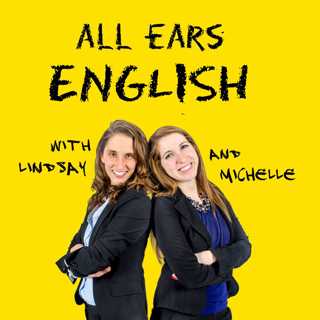
AEE 151: English Puns You Can Use at a Party
Taking IELTS? Get our free IELTS video training now Do you like to tell jokes at parties? Would you like to be able to tell a few jokes in English? Today you’ll learn how to play with words and have a lot of “pun”! What is a pun? It’s a creative use of the language, usually using the literal meaning of the language and then a more creative, idiomatic use of the word. Come back to our site to see the puns written out! Learn more about your ad choices. Visit podcastchoices.com/adchoices
17 Heinä 201410min

AEE 150: Let Go of Your Grammar Obsession and Speak English like a Native with Idahosa Ness from Mimic Method
Taking IELTS? Get our free IELTS video training now Today you’ll learn how to let go of your grammar mistakes and your obsession with perfection and you’ll learn how to finally speak like a native! Today we have Idahosa Ness who is the founder of the Mimic Method and he helps learners reach fluency through song lyrics and mimicking the language. What does it mean to “mimic” English speakers? To “mimic” means to copy. When you learn English, don’t learn from the written word. Learn from what you hear. Try to surround yourself with the language and repeat back what you hear. Don’t think about conjugating verbs in your head or making a mistake. When you focus too much on conjugating, it restricts your ability to take in new sounds in your head. There will be no space in your mind. Come back to our site for a summary Learn more about your ad choices. Visit podcastchoices.com/adchoices
16 Heinä 201421min

AEE 149: Practical Alternative Phrases for Saying I'm Sorry
Taking IELTS? Get our free IELTS video training now Yesterday we asked the question, “should you apologize?” and we asked if you are apologizing and saying sorry too much. Today we want to give you more ways to say “sorry” if you decide that you are in the right place and the right situation to offer an apology. You’ll see a comparison of 3 typical ways to apologize and 3 creative, new ways to apologize. Come back to our site to see the phrases written out. Learn more about your ad choices. Visit podcastchoices.com/adchoices
15 Heinä 201414min

AEE 148: Sorry, Not Sorry? Think Twice About Your Speech Habits
Taking IELTS? Get our free IELTS video training now Do you say “sorry” too much in English or in your native language? In today’s episode you’ll find out why you might not want to always say “sorry” and you’ll hear from the co-hosts about their different opinions on how and when to say sorry. Come back to our site to read a summary of this episode Learn more about your ad choices. Visit podcastchoices.com/adchoices
14 Heinä 201413min

AEE 147: Let Go of Good for Great
Taking IELTS? Get our free IELTS video training now As an English learner or in your everyday life, why do you need to let go of something “good” to wait for some “great” to come along? Today you’ll hear our personal examples and find out what this means for your English learning. If something is not amazing in your life then you should let it go and wait for something better to come along. This can be hard. It can be scary to sit in the open space after you let something go. Here is today’s quote: “If you are not willing to risk the unusual, you will have to settle for the ordinary.” -Jim Rohn Come back to our site for a summary of today's episode Learn more about your ad choices. Visit podcastchoices.com/adchoices
10 Heinä 201412min

AEE 146: Turgay Evren on How Learning English Online Will Make You Braver!
Taking IELTS? Get our free IELTS video training now Could learning English online make you a braver and more confident English speaker? Let’s find out today with our special guest, Turgay Evren. Turgay is an English instructor from Turkey and also an author of more than 60 ESL best-selling books. Turgay is going to tell us about the differences between learning English in a traditional classroom versus learning English online. Come back to our site to learn more Learn more about your ad choices. Visit podcastchoices.com/adchoices
9 Heinä 201421min

AEE 145: A Big Yes No Mistake You're Making in English and How to Fix it
You are making a big mistake! It’s time to stop and fix this common error with “yes/no” questions. Today you’ll hear a real conversation where we use “yes/no” questions and answers and you’ll see how to do it right in English. If someone asks you this: “Do you have any other questions?” The incorrect way to respond: “Yes I don’t have any other questions” The correct way to respond: “No I don’t have any other questions.” Come back to the show notes for more examples Learn more about your ad choices. Visit podcastchoices.com/adchoices
8 Heinä 201411min

AEE 144: Copy a Celebrity for English Success with Josh Plotkin from Brazilian Gringo
Taking IELTS? Get our free IELTS video training What's your English character? Today Josh Plotkin from Brazilian Gringo is going to show you how copying a celebrity and creating an English character can help you improve your English. You'll also learn how to learn more about the culture as well as the language when you try to become fluent in English. If you want to get fluent in a language you have to think about the people with whom you'll be using the language. Come back to our site for more Learn more about your ad choices. Visit podcastchoices.com/adchoices
7 Heinä 201422min





















